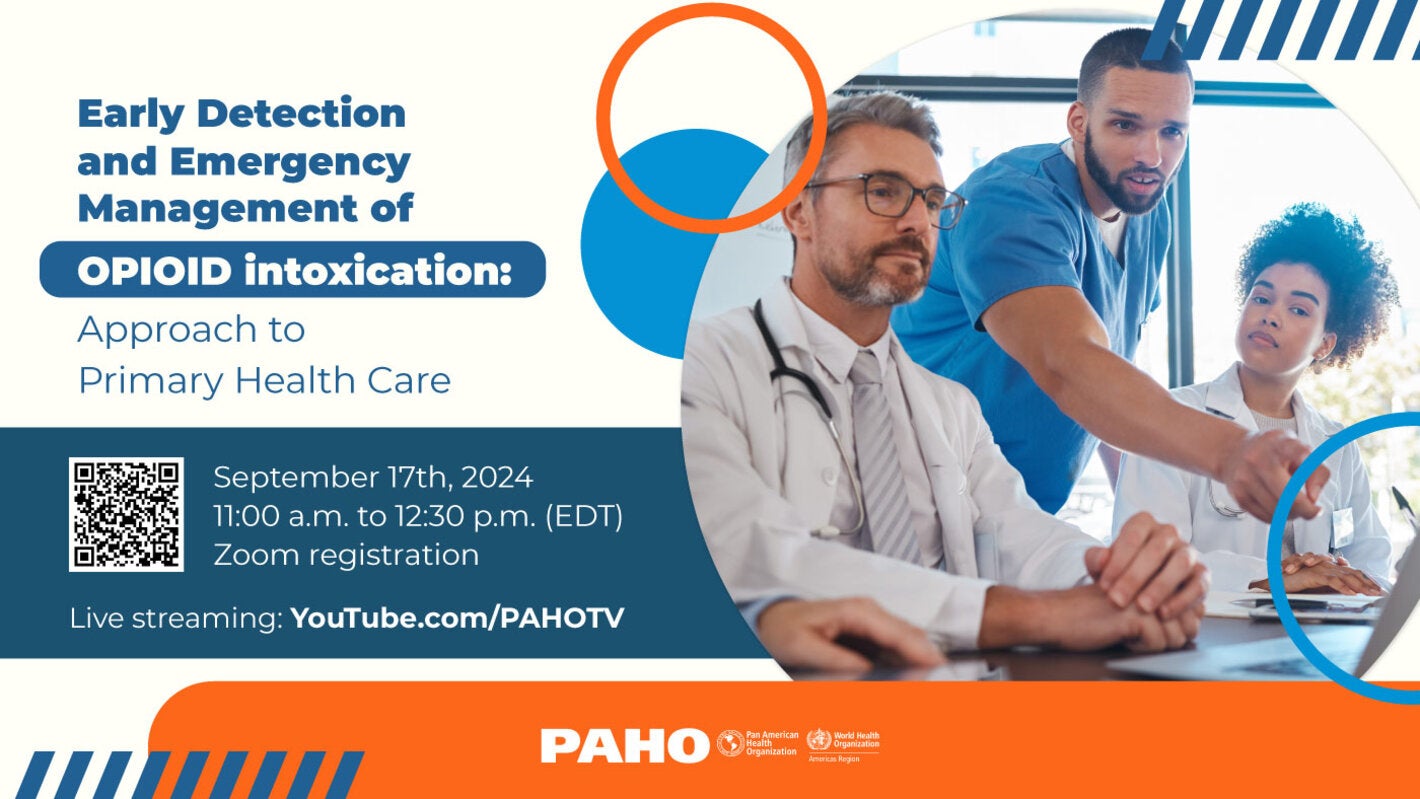
Join us on Tuesday, September 17, 2024, at 11:00 A.M. (Washington DC, or EDT) for the webinar “Early Detection and Emergency Management of Opioid Intoxication: Approach to Primary Health Care”. Identifying at the Primary Health Care (PHC) level people at risk for opioid consumption problems and carrying out timely and emergency interventions that reduce mortality and health deterioration due to their consumption, is a necessary and anticipated decision that must be prioritized in the face of the situation of increasing supply and consumption of opioids in the Region.
Objectives of the webinar:
1. Participants will identify the need to prioritize strategies in primary care for the early identification and management of people who may be at risk for drug use in general and specifically for opioid use
2. Participants will have basic knowledge for the recognition of symptoms and signs of opioid use, their initial management and emergency treatment options, and needs for comprehensive interventions in search of recovery
3. An accessible audiovisual medium will be available to all interested parties in virtual media and channels, which can serve as training material about opioids, early recognition of the risks of their consumption, and the comprehensive interventions that are required
How to participate
- Date: Tuesday, 17 September 2024
- Time: 11:00 A.M. (Washington D.C. or EDT) [Check the time in other cities at the bottom of this page]
- Languages: Spanish, English, and Portuguese with simultaneous translation.
- Registration: https://paho-org.zoom.us/webinar/register/WN_Q6ZbL1VGROu79b641WDqkA#/registration
Context
Even though Fentanyl is one of the synthetic drugs of this group that generates the most alarm for the population, there are other problematic consumptions and mixtures with other drugs within opioids, which must be considered to propose effective interventions.
The comparative burden of disease and premature death indicator for drugs in the region and globally shows a situation of consumption that should alert national authorities to promote and implement strategies to address this situation effectively. In North America, opioid use disorders account for 79% of the burden of disease caused by drug use disorders, while globally, it is 71%. Although in the rest of the subregions of the Americas, the magnitude of the burden of disease from opioids is lower, with variations between 55% and 44%, such levels should be taken into account to formulate effective intervention strategies (World Health Estimates 2000-2019, WHO).
Strategies to prepare health services, seeking to improve access for drug users in general and opioid users in particular to reduce the risk of complications and death, must consider overcoming access barriers that prevent timely care; stigma, lack of information, non-inclusion in health policies and plans, unavailability of medications, and low knowledge and training of health personnel on these issues can be some of the barriers that obstacle care for those who require it.
In this Webinar and through presentations and conversation exchanges with experts from the Region, the aim is to describe the mechanisms of action and health risks of opioid use, the current problem of the burden of disease for the Region of America, the timely recognition of signs of intoxication and their emergency management, and recommendations in general for effective interventions in primary care.
The proposed topic of presentation and discussion is framed in the Sustainable Development Goals (Goal 3: Ensure healthy lives and promote well-being for all) through the improvement of Access to Health Services for the achievement of universalization; specifically, target 3.5 "strengthen the prevention and treatment of substance abuse, including the misuse of narcotic drugs and the harmful use of alcohol."
Agenda
(Click on the titles to download the presentations)
Introduction: The Problem of Opioid Use in the Americas Region and the burden of disease
- Dr. Mario A Zapata, Regional Advisor on Alcohol and Drugs PAHO/WHO
- Dr. Silvia Cruz Martin del Campo, Biologist, MSc and PhD in Pharmacology Researcher in Neurobiology of Addictions. CINVESTAV: Centro de Investigaciones y Estudios Avanzados México
- Dr. Ana Maria Cano Rentería, M.D. Specialist in Psychiatry. Advanced Member - International Society of Substance Use Professionals ISSUP and Active Member of the Addictions Committee of the Colombian Association of Psychiatry. UNODC advisor and consultant in addiction treatment and Opioids.
- Dr. Sarah E. Wakeman, MD, Senior Medical Director for Substance Use Disorder at Mass General Brigham and Medical Director of the Program of Substance Use and Addiction Services at Massachusetts General Hospital, Associate Professor of Medicine at Harvard Medical School.
Interaction of experiences, guest countries of the Region and conclusions
- Dr. Renato Oliveira, Head of Mental Health and Substance Use Unit, OPS/OMS
Time in other cities
- 8:00 a.m. – Los Angeles, Vancouver.
- 9:00 a.m. - Belmopan, Guatemala City, Managua, Mexico City, San Jose (CR), San Salvador, Tegucigalpa,
- 10:00 a.m. – Bogota, Kingston, Lima, Panama City, Quito
- 11:00 a.m. – Asunción, Bridgetown, Caracas, Georgetown, Havana, La Paz, Port of Spain, Port-au-Prince, Nassau, Ottawa, Santiago, San Juan, Santo Domingo, Washington D.C.
- 12: 00 a.m. - Buenos Aires, Brasilia, Montevideo, Paramaribo.
- 5:00 p.m. – Geneva, Madrid.
For other cities, check the local time using the following link.
